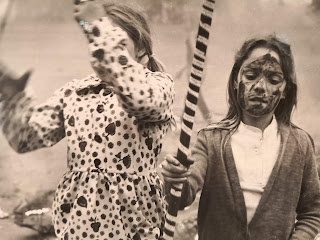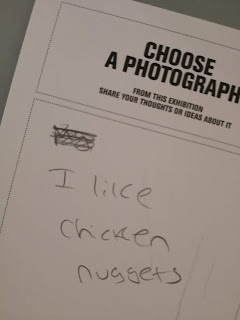Tish Murtha - Elswick Kids (1978)
I was back at The Photographers' Gallery, ostensibly to see Alex Prager's Silver Lake Drive but also at the same time to take in a small collection of black and white photographs by South Shields' Tish Murtha (1956-2013). Tish Murtha:Works 1976 to 1991 explored six of the major projects of social documentary photography that Patricia Anne Murtha undertook after undertaking a photograhy course in Newcastle.
It was like going to visit a friend who pulls out an old box full of snaps you've never seen before and flicks through them with you while reminiscing about the old days over a cup of tea or a glass of wine. That's how lovingly rendered most of the images are. There is one difference though. These are people you don't know. Even if you do, or certainly did, know people much like those in the photos. Very possibly you once were a person very much like those in the photos. The kid on the left in the photo below looks like my mate Ian's son, Peter.
Tish Murtha - Elswick Kids (1978)
Whilst capturing unguarded and unposed moments in the lives of their subjects they also reflect upon a troubled and testing time, much like now, in British social history. A period of transition, a period of strikes, and a period that saw the rise of the far right and all the attendant racism that that comes with.
The children in 1978's Elswick Kids look as playful, innocent, and dirty faced as ever but the background to their escapades is that of bonfires and abandoned cars. This is west Newcastle in decline as the shipbuilding industry collapsed and these kids are making the most of their meagre opportunities in life, turning the scrapyard of their lives into playgrounds. In almost every single image of the series you can see both the decay and neglect the area suffered and the vitality and exuberance the children represent. If you believe children our are future then you really ought to be providing a better environment for them than this.
Tish Murtha - Elswick Kids (1978)
Tish Murtha - Elswick Kids (1978)
Tish Murtha - Elswick Kids (1978)
Tish Murtha - Elswick Kids (1978)
Tish Murtha - Elswick Kids (1978)
When Murtha returned to Elswick nearly ten years later for her Elswick Revisited series (1987-1991) these kids had grown up and, as we can see, the area had diversified massively. This series focused on immigration into the area and the racism and other travails suffered by those moving there. We can witness just how much the rot has really set in and it looks as if the government of the time, the Thatcher/Major era, have done a good job of fostering distrust and dislike of the 'other'.
Divide and conquer, and divert attention away from what's really causing the problems, is the oldest trick in the book and here, as now, it seems to be working. I can't give the Tories much credit for any of their policies but what I can say is that they can enact with punishing, literally in many cases, exactitude (at least until the current Brexit shitstorm which as well as potentially bringing the UK to an end may hopefully destroy the Tory party from within) and they can lie through their teeth about it until the blue passports and Brexit 50ps come home and until people vote for them again.
Tish Murtha - Elswick Revisited (1987-1991)
Tish Murtha - Elswick Revisited (1987-1991)
Tish Murtha - Elswick Revisited (1987-1991)
Tish Murtha - Elswick Revisited (1987-1991)
Tish Murtha - Elswick Revisited (1987-1991)
Tish Murtha - Elswick Revisited (1987-1991)
Tish Murtha - Elswick Revisited (1987-1991)
Asian faces of acceptance or defiance are forced to share space with the tattooed neck boot boys of the far right. It was an era of dogshit through letterboxes. It was an era of racist graffiti. It was an area of institutionalised racism. It's an era that Iain Duncan-Smith and Jacob Rees-Mogg would like us to go back to. And then some.
Between these two series Murtha worked in London where she moved in 1982. Like many newcomers to the capital she became intrigued, fascinated even, by the seedy nightlife of Soho and she collaborated with dancer and stripper Karen Leslie who provided text to accompany Murtha's images and served as critique of the sex industry. Here the curators miss a trick by failing to provide that text. The images stand alone and, as such, they're possibly more prurient than intended. If fairly innocent for these times.
Possibly too risque for Facebook though who recently blocked me from posting links to my blog after an account of a visit to a Robert Mapplethorpe exhibition (originally posted in December 2016) that included an image of a man with an erect cock. Facebook is, of course, headquartered in America where it seems that nudity, even non-pornographic nudity, is more offensive than visiting a synagogue, a school, or a country music concert and shooting a load of perfect strangers dead. A country whose president is a Christian hate preacher of the highest order who boasts about grabbing women by the pussy. So in America you can sexually assault people, not just with impunity but be rewarded for it - but if you share an image of a breast or a penis you will be no-platformed. We really are deep into the dark logic of Trump, aren't we?
Tish Murtha - London by Night/Later London Works (1983-1986)
Tish Murtha - London by Night/Later London Works (1983-1986)
Tish Murtha - London by Night/Later London Works (1983-1986)
Still, I digress. The world of live sex shows, seedy cinemas, and brothels still exists in Soho but it's slowly disappearing as the area becomes gentrified and homogenous. Whilst this is, obviously, not entirely a bad thing (sex workers live a very fraught life exposed to potential violence and exploitation) it shouldn't blind us to the fact that this crap still goes on. Just not there so much these days.
Unemployment, also, is another thing our current politicians like to pretend doesn't exist any more. But zero hours contracts, the gig economy, and people on such low wages they need to use food banks suggest that the supposedly sunny world of full employment is a smokescreen. I've not had full time permanent work for two years and I've not signed on or claimed a single penny in benefits.
That's partly because I was fortunate to have some money put aside after decades of working and partly because the sums would be so paltry that it was hardly worth it. But, as with the sex industry, what has changed is what unemployment looks like now.
In Murtha's 1981 series Youth Unemployment we can see the familiar tropes of early eighties unemployment, so familiar from television shows like Going Out and Boys from the Blackstuff. Look, it's all there. Youngsters goofing around on the street, people looking bored, people wearing scruffy clothes, and a massive piece of graffiti that reads 'COPS PISS OFF'. It almost makes me wish we were back there. Perhaps others feel that way. Maybe that's why they voted for Brexit. Who the fuck knows?
Tish Murtha - Youth Unemployment (1981)
Tish Murtha - Youth Unemployment (1981)
Tish Murtha - Youth Unemployment (1981)
Tish Murtha - Youth Unemployment (1981)
Tish Murtha - Youth Unemployment (1981)
Tish Murtha - Youth Unemployment (1981)
Like the Elswick photographs, the Youth Unemployment series shows defiance and hope as much as it does dejection and despair. The subjects may have been disadvantaged from the start but Murtha refuses to strip them of their humanity or their individuality.
1979's Juvenile Jazz Bands is almost joyous in its defiance although her portrayal, that lightly criticised the mock-military nature of these bands, did not necessarily go down well with the families of her subjects.
Tish Murtha - Juvenile Jazz Bands (1979)
Tish Murtha - Juvenile Jazz Bands (1979)
For me, that's a bit harsh. The photographers' role isn't to airbrush or to prettify (nor is it to demonise or objectify) but to capture an image that, perhaps, asks more questions than it provides answers. Murtha manages this with no little panache. What's on the flag? What are the majorettes looking at? What's the hierarchy of these strange, some official/some impromptu, societies? And, most importantly of all, and perhaps never to be answered, just who does Keith love?
Tish Murtha - Juvenile Jazz Bands (1979)
Tish Murtha - Juvenile Jazz Bands (1979)
Tish Murtha - Juvenile Jazz Bands (1979)
Tish Murtha - Juvenile Jazz Bands (1979)
A topless boy stands sentry in front of this spray painted legend, a moment captured in time that speaks of youth, speaks of civic pride, and speaks of the confusing mixed up way we lived then and lived now. How things that once seemed so important now make no sense. I hope we'll one day look back at these times and feel the same way. What the fuck was that all about?
I'd say the 'Keith loves' photo, in that respect, spoke the loudest truths to me of any in the exhibition but then I looked at the comments board, a feature the Photographers' Gallery seems particularly fond of, and read the sentence "I like chicken nuggets" and thought, that in this crazy fucked up world, that makes about as much sense as anything else - and I don't even like chicken nuggets. I'm a vegetarian.



































No comments:
Post a Comment